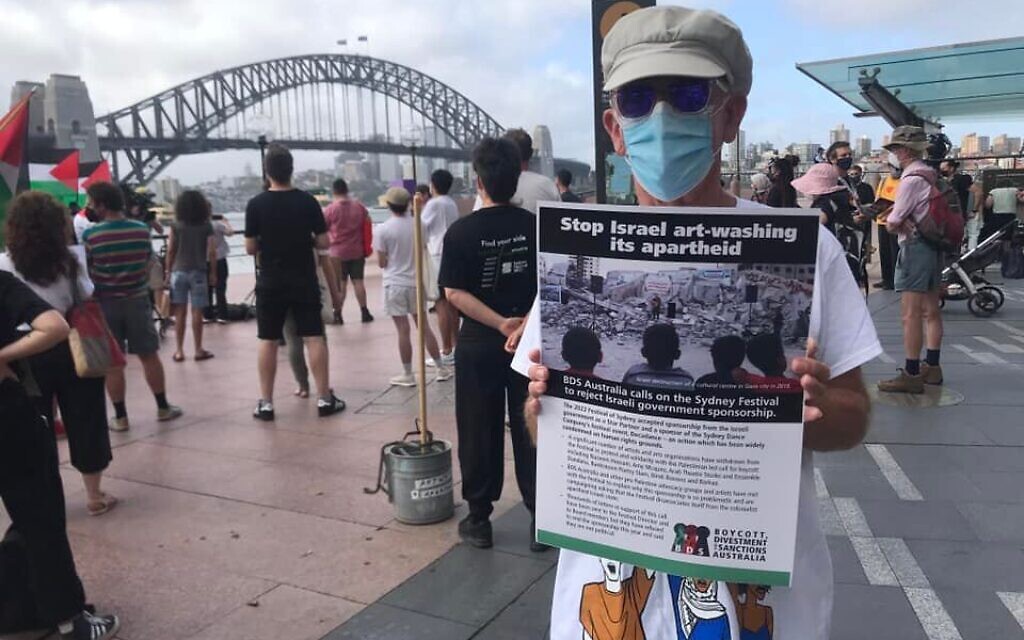Australia/Israel Review, Featured
Editorial: Farce at a Festival
Jan 31, 2022 | Colin Rubenstein

Even before this year’s Sydney Festival opened, Australians were treated to farcical political theatre, courtesy of a staged disinformation campaign by local anti-Israel Boycott, Divestment and Sanctions (BDS) movement activists.
The boycotters aimed to intimidate event organisers into reneging on a sponsorship arrangement with the Israeli Embassy to facilitate the staging of a dance performance by the Sydney Dance Company created by the world-renowned Israeli choreographer Ohad Naharin.
The stunt followed the well-worn playbook of strong-arm tactics BDS has followed at festivals internationally. Yet the fact is, they failed.
While a number of acts – some previously known BDS supporters – withdrew from the event, according to the anti-BDS artistic group the Creative Community for Peace, the vast majority of artists, performers and staff – some 800 in all – remained in the festival.
The Sydney Festival did nothing to deserve their attack. Sponsorship arrangements, of the kind the Sydney Festival reportedly solicited from the Israeli Embassy, have been the rule at such arts events, not the exception, here and abroad.
Indeed, the Chinese Communist Party, engaged in an ongoing genocide of the Uighurs, sponsored the Sydney Festival from 2013 to 2020, through the state-owned China Southern Airlines. There were no hints of any boycotts over that sponsorship.
Moreover, previous visits by Naharin to Australia’s top-tier Melbourne and Sydney Festivals had also been supported in part by donations from the Israeli Embassy, and its logo appeared on official festival websites. Yet this year, boycotters hyped such sponsorship to artists and journalists as something unprecedented that made them somehow “unsafe”.
While anti-Israel activists had been satisfied to protest on previous occasions, the level of intimidation at this year’s Sydney Festival crossed all red lines.
Their attempt at sowing controversy relied upon the demonisation and delegitimisation of Israel; bullying and moral blackmail of artists; and the acceptance a priori that Israel, and all Israelis by extension, uniquely deserve to be ostracised and excluded from the global community in all respects, whether in commerce, sports, academia or, as in this case, the arts.
The supposed basis for such extremism rests on a mob mentality stoked by caricature-like distortions and outright lies and fabrications driven by hyperbolic, emotional slogans amplified over social media.
Such misrepresentations include claims that Jews are not indigenous in their own homeland; that Israel is an “apartheid” society, even though all its citizens have equal rights and Arabs are prominent across all sectors, including government; and never mentioning the ongoing terrorism emanating from Hamas-ruled Gaza or from the West Bank.
BDS is an insidious movement whose tactics, strategies and aims, as stated by its leaders, make it clear that they don’t want a Palestinian state alongside Israel, but to effectively replace Israel through the so-called Palestinian “right of return” – a fanciful notion without any basis in international law – aimed at demographically erasing Israel’s Jewish majority.
It is in this sense that the BDS movement flirts with antisemitism, because it is motivated by an intense animosity and extremism which amounts to an effort to deprive Jews of the right to self-determination afforded to other peoples.
Meanwhile, the BDS movement’s formula of placing the blame for the ongoing lack of Palestinian statehood on Israel – which it demonises as a colonialist apartheid entity that has never and will never voluntarily seek peace – is not only ahistorical nonsense, but a recipe for perpetuation of the conflict forever.
It is particularly counterproductive in these otherwise more promising times following the historic Abraham Accords, when we are witnessing genuine normalisation between Israel and several regional Arab and Muslim countries – Bahrain, Morocco, the United Arab Emirates and Sudan – and considerable interest in potentially following suit by numerous other nations.
Moreover, BDS supporters wilfully ignore the irrefutable fact that Israel’s Arab minorities are themselves demanding from their Knesset representatives that they end their historical preference for sitting in opposition and take a more proactive role in government.
Israel’s current government coalition could not have been formed last year without the participation of an Islamist Israeli Arab party, Ra’am. This bold political partnership has already delivered unprecedented political achievements for Israel’s minorities in terms of budget allocations, resolving land disputes and improved public safety and infrastructure.
Ironically, across the Green Line, the Palestinian Authority’s leaders don’t practise BDS – President Mahmoud Abbas visited Defence Minister Benny Gantz’s home for informal talks recently.
Still, they’ve essentially boycotted the negotiating table for almost a decade and rejected, without counteroffers, three comprehensive Israeli peace proposals over the past two decades that would have realised the creation of a Palestinian state on practically all of the land area of the West Bank and Gaza.
Ironically, among Israelis, choreographer Naharin is well known for his criticism of Israeli government policies and his sympathy for Palestinian aspirations. He even told reporters he would support BDS if he felt it would help Palestinians – but he knows it does not.
This is not only the assessment of Naharin and other prominent Israeli peace activists but also of many Palestinians themselves. Veteran human rights campaigner Bassem Eid recently noted, “We have to tell people what the facts are… The facts are that BDS is hurting Palestinians more than Israelis.”
Israel has its share of internal problems and is open to criticism, like all democracies. Yet the BDS movement doesn’t criticise Israel for what it does, but delegitimises Israel for what it is – a Jewish and democratic state that offers equal rights to all of its citizens.
The majority of Australians, who reject BDS, must continue to speak out against this ugly discriminatory movement in Canberra, in state capitals and in homes and schools. Otherwise, they risk being drowned out by the megaphones and social media mob attacks of the zealots, with terrible implications for the health of Australian liberal democracy well beyond this important, but relatively narrow, bellwether issue.
Tags: Anti-Zionism, Australia, BDS, Israel






